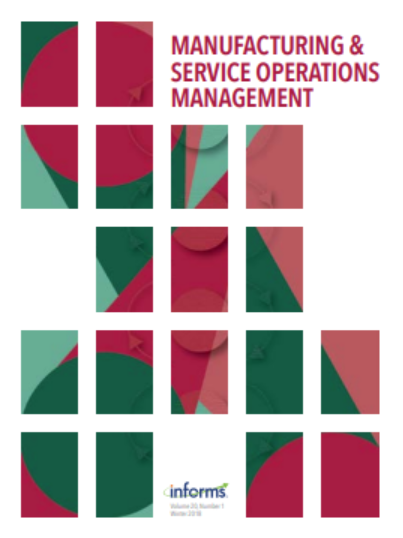注意差距:在线学习平台互动中的性别差异
IF 4.8
3区 管理学
Q1 MANAGEMENT
M&som-Manufacturing & Service Operations Management
Pub Date : 2023-08-31
DOI:10.1287/msom.2022.0426
引用次数: 0
摘要
问题定义:教育技术创新,如大规模开放在线课程(MOOC)平台,可以通过向传统上处于劣势的学习者(如女性)提供教育,从而实现更具包容性的学习环境。然而,包容性并不一定意味着平台上的平等待遇。我们调查了女性和男性学习者是否从在线学习平台上的论坛讨论(通常是唯一可用的互动形式)中同样受益。方法/结果:利用Coursera上174门课程的大规模互动级数据集,我们发现在MOOC论坛上,男性和女性学习者在收到回复方面存在经济上相当大的统计学差异。平均而言,女性学习者的问题得到教学人员回复的可能性比男性学习者的问题低3.11个百分点,相当于女性群体平均水平的15.2%。我们还发现,在员工回应质量和情绪方面,存在显著的性别差异。我们使用包括文本分析工具在内的新技术来研究性别差异背后的可能机制。我们的研究表明,这种差异不是由于男女学习者帖子的内容差异,也不是由于他们的语言风格或海报的声誉。相反,我们的研究结果与男性驱动的性别同质机制最为一致;虽然女性工作人员在与学习者的互动中性别中立,但男性工作人员系统地倾向于回应男性学习者的帖子。我们还表明,接受员工的反馈可以显著提高课程通过率,尤其是女性学习者。因此,通过课程论坛获取信息的不平等阻碍了女性学习者的学习成绩。管理意义:我们的研究结果为平台和内容提供商提供了运营和组织建议,包括去性别化用户标识符,实施以内容为中心的帖子推荐系统,纳入性别中立的用户声誉系统,促进女性教学人员的招聘,以及提供强调性别中立互动重要性的员工培训。补充材料:在线附录可在https://doi.org/10.1287/msom.2022.0426上获得。本文章由计算机程序翻译,如有差异,请以英文原文为准。
Mind the Gap: Gender Disparity in Online Learning Platform Interactions
Problem definition: Education technology innovations, such as massive open online course (MOOC) platforms, could potentially enable a more inclusive learning environment by delivering education to traditionally disadvantaged learners, like women. However, inclusivity does not necessarily translate into equal treatment on the platform. We investigate whether female and male learners benefit equally from forum discussions—typically the only form of interaction available—in online learning platforms. Methodology/results: Utilizing a large-scale, interaction-level data set on 174 courses on Coursera, we uncover an economically sizable and statistically significant disparity between male and female learners in receiving responses to their posts in MOOC discussion forums. On average, female learners’ questions are 3.11 percentage points less likely to receive responses from teaching staff than male learners’ questions, which equals 15.2% of the female group average. We also find significant gender disparity in staff response quality and sentiments. We investigate possible mechanisms behind the gender disparity using new techniques, including textual analysis tools. We show that the disparity is not because of content differences in male and female learners’ posts, nor is it attributable to their linguistic styles or the reputation of the posters. Instead, our results are most consistent with a male-driven gender homophily mechanism; although female staff members are gender neutral in their interactions with learners, male staff members systemically prefer responding to posts from male learners. We additionally show that receiving staff response leads to significant improvement in course passing rates, particularly for female learners. Therefore, the unequal access to information through course forums unfavorably hinders female learners’ performance. Managerial implications: Our results provide operational and organizational suggestions to platforms and content providers, including degendering user identifiers, implementing a content-focused post recommendation system, incorporating a gender-neutral user reputation system, promoting the recruiting of female teaching staff, and providing staff training that highlights the importance of gender-neutral interactions. Supplemental Material: The online appendix is available at https://doi.org/10.1287/msom.2022.0426 .
求助全文
通过发布文献求助,成功后即可免费获取论文全文。
去求助
来源期刊

M&som-Manufacturing & Service Operations Management
管理科学-运筹学与管理科学
CiteScore
9.30
自引率
12.70%
发文量
184
审稿时长
12 months
期刊介绍:
M&SOM is the INFORMS journal for operations management. The purpose of the journal is to publish high-impact manuscripts that report relevant research on important problems in operations management (OM). The field of OM is the study of the innovative or traditional processes for the design, procurement, production, delivery, and recovery of goods and services. OM research entails the control, planning, design, and improvement of these processes. This research can be prescriptive, descriptive, or predictive; however, the intent of the research is ultimately to develop some form of enduring knowledge that can lead to more efficient or effective processes for the creation and delivery of goods and services.
M&SOM encourages a variety of methodological approaches to OM research; papers may be theoretical or empirical, analytical or computational, and may be based on a range of established research disciplines. M&SOM encourages contributions in OM across the full spectrum of decision making: strategic, tactical, and operational. Furthermore, the journal supports research that examines pertinent issues at the interfaces between OM and other functional areas.
 求助内容:
求助内容: 应助结果提醒方式:
应助结果提醒方式:


